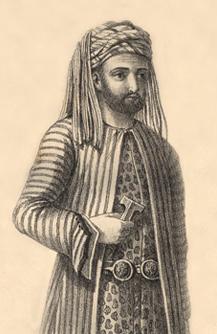Agha (title)


Agha, also Aga (Ottoman Turkish: آغا, Persian: آقا āghā "chief, master, lord"[2]), is an honorific title for a civilian or military officer, or often part of such title, and was placed after the name of certain civilian or military functionaries in the Ottoman Empire. At the same time some court functionaries were entitled to the agha title.
Etymology
The word agha entered English from Turkish,[2] and the Turkish word comes from the Old Turkic aqa, meaning "elder brother".[3] It is an equivalent of Mongolian word aqa or aka.[4]
In Kurdistan
In Kurdistan the tribal Kurdish society gives the title "agha" to tribal chieftains - either supreme chieftains or village heads. It is also given to wealthy landlords and owners of major real estate in the urban Kurdish centers, although these landlords are usually with heavy[clarification needed] tribal relations. The common tribesmen would[when?] honor the chieftains or the village heads by calling them "agha" or "agha so-and-so. The "agha" would usually have a diwan or diwan-khane, a special room, or house, dedicated to the "agha" and his male guests, for sitting and drinking tea, discussing the affairs of the tribe and other mundane subjects. The agha and his guests would listen at times for local or visiting singers and story tellers (usually Jewish merchants or peddlers), who would entertain the "agha" and his guests. The common agha was in fact one person who was in charge of several major tasks of the tribal society under his jurisdiction: he was the head of the political unit, the main judge and arbitrator, the main military leader of his armed tribesmen, the main finance minister responsible mainly for receiving dues from his subjects for their harvest and commercial transactions carried out under his jurisdiction. One of the best[citation needed] studies on "aghas" in Kurdish society is the book by Mordechai Zaken, Jewish Subjects and their tribal chieftains in Kurdistan.[5]
Other uses
"Agha" is nowadays used as a Persian honorific title for men, the equivalent of "Mr" in English.[6] The corresponding honorific term for women is khanum.
See also
- State organisation of the Ottoman Empire
- Agaluk
- Agha of the Janissaries
- Kapi Agha
- Kizlar Agha
- Silahdar Agha
References
- ^ Narrative of Residence in Koordistan and on the Site of Ancient Nineveh, pages 66 and 214, Claudius James Rich, Published 1836, J. Duncan, 860 pages
- ^ a b "Online Etymology Dictionary". Etymonline.com. Retrieved 2017-06-30.
- ^ Turkish. "Aga | Define Aga at Dictionary.com". Dictionary.reference.com. Retrieved 2017-06-30.
- ^ "*Etimoloji: Kökenbilim, kelimelerin aslını ve evrimini inceleyen disiplin ~ EYun étymon "asıl" + logeía "bilim"". Nisanyansozluk.com. Retrieved 2017-06-30.
- ^ "Customer Reviews: Jewish Subjects and Their Tribal Chieftains in Kurdistan (Jewish Identities in a Changing World)". Amazon.com. Retrieved 2017-06-30.
- ^ Khani, S., and R. Yousefi. "The study of address terms and their translation from Persian to English." (2014).
